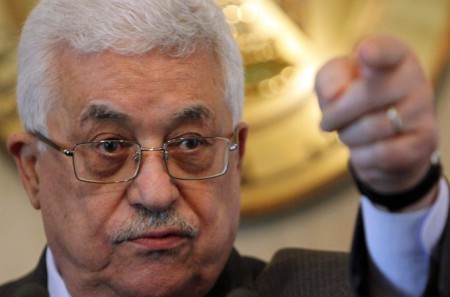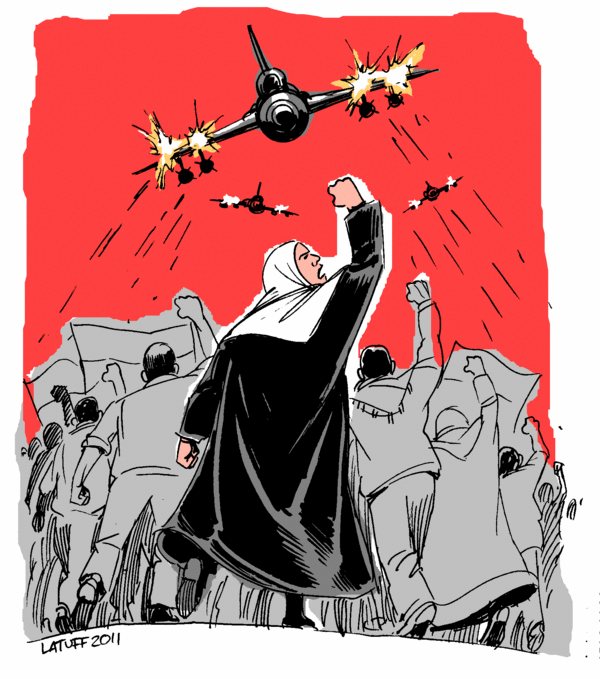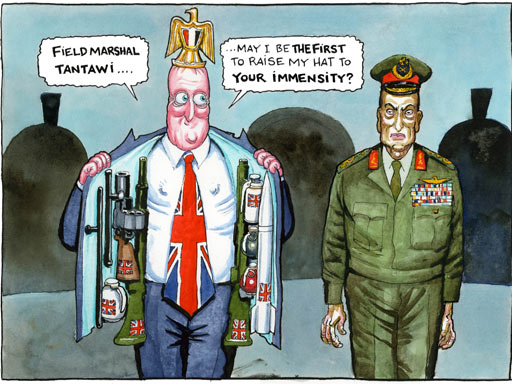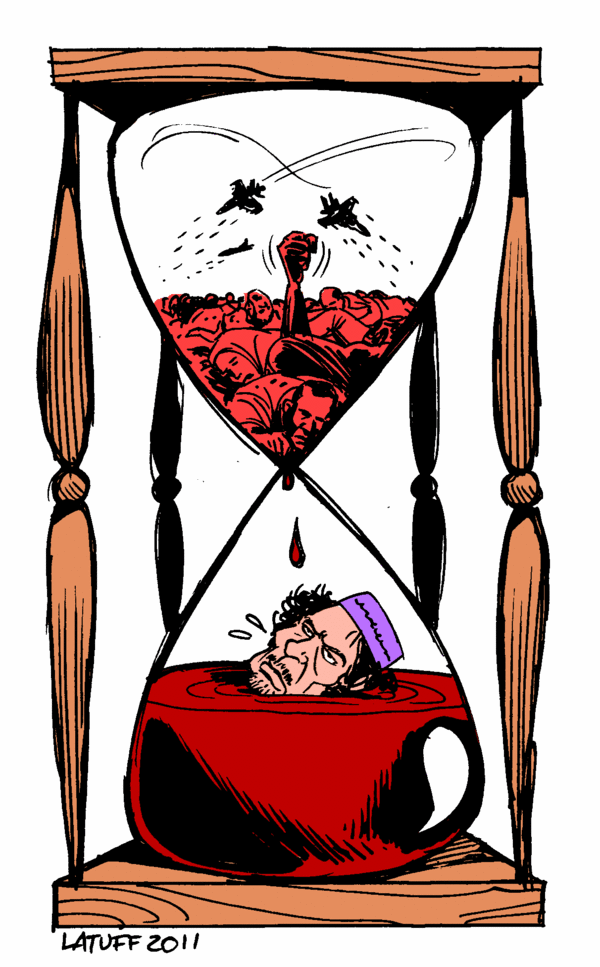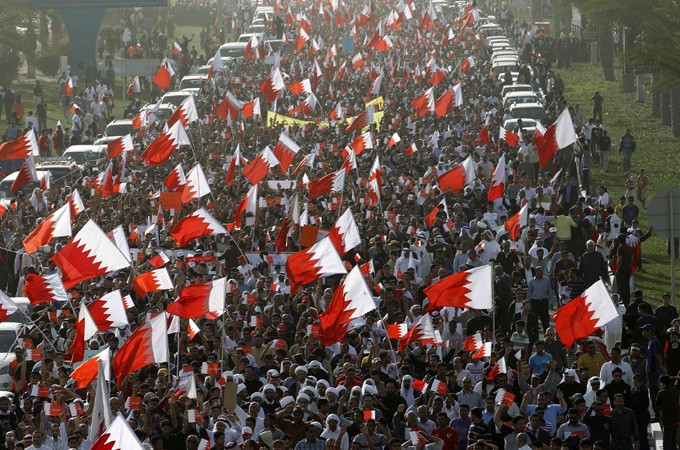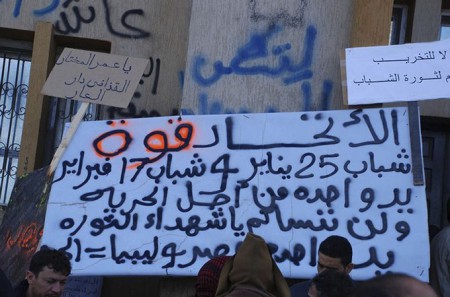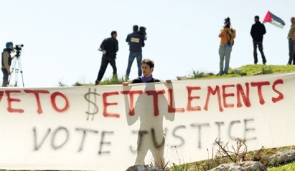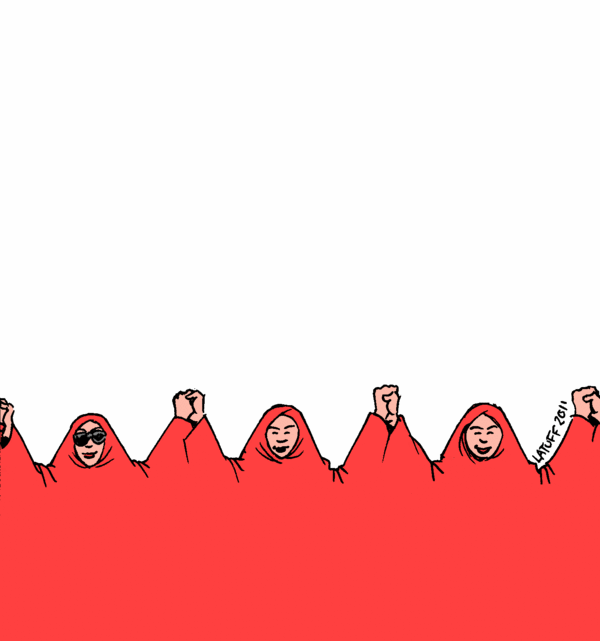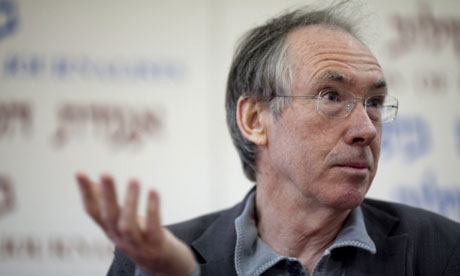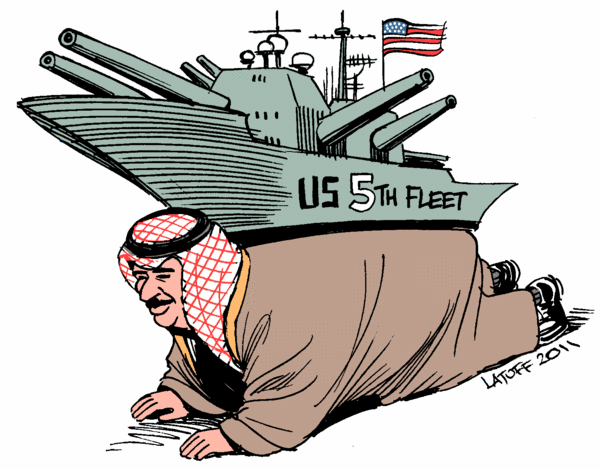EDITOR: How much longer for the Butcher of Tripoli?
All around Gaddafi, his trusted henchmen are deserting him, despite having worked for him for long decades. While one may well question their sudden democratic zeal, it is clear they know a sinking ship when they see one… His days must now be numbered, but the danger he poses to his countrymen is all the more potent, as he now knows that he is finished, with nothing much to lose but his head.
Gaddafi’s defectors denounce ‘government of Mussolini and Hitler’: BBC
Some of the former Libyan ministers and diplomats who have turned on the regime of Muammar Gaddafi
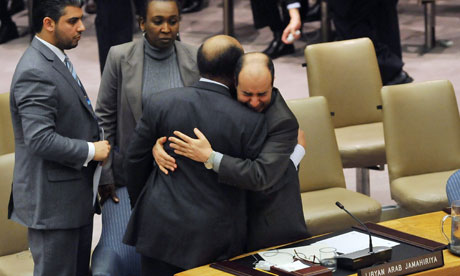
Abdurrahman Shalgham, Libyan ambassador to the United Nations
Previously a Gaddafi loyalist and a long-standing friend of the dictator, Shalgham pleaded with the security council to “save Libya” from its leader.
He said he “could not believe” Muammar Gaddafi’s troops were firing on the protesters, and backed sanctions against him. In an impassioned speech, he said the protesters were asking for their rights. “They did not throw a single stone and they were killed. I tell my brother Gaddafi: leave the Libyans alone.” When Shalgham finished addressing the security council, he was embraced by his weeping deputy, Ibrahim Dabbashi, another former Gadaffi loyalist, who had defected days earlier. Dabbashi described Gadaffi as a “madman” who would never resign.
General Abdel Fattah Younes al-Abidi, former interior minister
Al-Abidi was sent to Benghazi to ensure the suppression of the protests. Instead, he rang Gaddafi and persuaded him not to use warplanes to crush the rebels. Since al-Abidi had responsibility for training the regime’s elite forces, his announcement was a severe blow to Gaddafi.
An apparent assassination attempt persuaded the general to join the uprising, saying: “I hereby announce that I have abandoned all my duties to respond to the 17 February revolution.”
Mustafa Abdel-Jalil, former justice minister
Resigned last week and said he expected Gaddafi to make good on his pledge to die on Libyan soil. “Gaddafi’s days are numbered,” he said. “He will do what Hitler did – he will take his own life.” He also told a Swedish newspaper that he knew that Gaddafi was employing foreign mercenaries. “I knew that the regime had mercenaries before the uprising,” he said. “The government decided in several meetings to grant citizenship to the [mercenaries] from Chad and Niger. That was something that I objected to.”
Abdel-Jalil claims he has proof that Gaddafi personally ordered Abdelbaset al-Megrahi to carry out the Lockerbie attack in 1988. Libyan efforts to get al-Megrahi home in 2009 were motivated primarily by Gaddafi’s desire to “hide” the truth ahead of the bomber’s appeal against his sentence, he said.
Suleiman Aujali, Libyan ambassador to the United States
Resigned last Tuesday, saying: “I am resigning from serving the regime I am serving, but not resigning from serving our people. They need me to be around to get the international community to raise their voice, to stop this massacre.” Aujali was made ambassador to the US on 6 January 2009. In September 2009, he defended the transfer of al-Megrahi from Scotland to Libya, arguing that most Libyans thought he was falsely convicted.
Two other Libyans have also resigned from the Washington DC mission, according to al-Jazeera. Saleh Ali al-Majbari and Jumaa Faris denounced Gaddafi, saying he “bears responsibility for genocide against the Libyan people in which he has used mercenaries”.
Mohamed Salaheddine Zarem, Libya’s ambassador to France, and Abdulsalam el-Qallali, the ambassador to Unesco
Both have also resigned. El-Qallali said: “We condemn the repression taking place in Libya and the extreme violence carried out by militia security forces against peaceful protesters who only demand freedom and dignity. We confirm our support for the revolution.”
Ali al-Essawi, Libyan ambassador to India
Resigned after condemning the use of foreign mercenaries to quell protests.
Abdel Moneim al-Huny, Libya’s permanent representative in the Arab League
Announced resignation last Sunday. Al-Huny said Gaddafi, his commanders and aides should be put on trial for “the mass killings in Libya”. He said: “Gaddafi’s regime is now in the dustbin of history because he betrayed his nation and his people.”
Hussein el-Sadek el-Mesrati, senior Libyan diplomat in Beijing
Told Al-Jazeera: “I resigned from representing the government of Mussolini and Hitler.”
Air force pilots
Two Libyan pilots defected to Malta by landing their Mirage F1 fighter jets on the island after disobeying orders to attack protesters in Benghazi.
Interim Libyan govt wins support: Al Jazeera online
“Caretaker administration” led by former justice minister gains the endorsement of the Libyan envoys to the UN and US.
27 Feb 2011
Ali Aujali, Libya’s ambassador to the United States, has said that he supports the interim government being formed in Benghazi by the country’s former minister of justice.
Aujali said on Saturday the caretaker administration, which announced it would lead the country for three months to prepare for elections, was “the government for the whole of Libya”.
“We want to support this government as the caretaker government until the liberation of all of Libya, which I hope will happen very soon,” he said.
Libya’s deputy UN ambassador, Ibrahim Dabbashi, also said on Saturday that his delegation supported “in principle” Abud Ajleil’s caretaker government.
“In principle we support this government,” Dabbashi, one of the first Libyan diplomats to denounce Gaddafi, told Reuters. “We are seeking more information about it, but yes, I think we support it.”
Former Libyan justice minister Mustafa Mohamed Abdel Jalil – who resigned from Gaddafi’s cabinet on Monday in protest at the killing of protesters – earlier told Al Jazeera he had led the formation of an interim government based in Benghazi, Libya’s second city, in the eastern part of the country now largely free of Gaddafi’s control.
He said the transitional government “has military and civilian personalities”.
“It will lead for no more than three months – and then there will be fair elections and the people will choose their leader,” he said.
Aujali, a veteran Libyan diplomat, praised Abdel Jalil.
“He is a very honest man. He was in charge of the justice issue in the eastern part of Libya when the regime asked him to hang an innocent Libyan citizen and he refused,” Aujali said.
“I am sure he will gain support of all Libyans and of the international community,” he added.
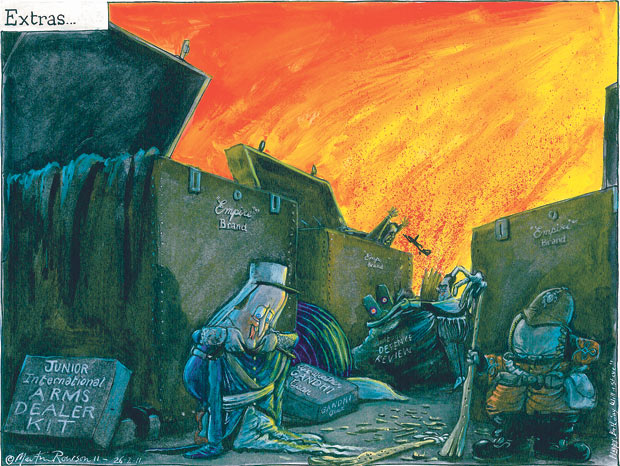
Libya: UN Security Council votes sanctions on Gaddafi: BBC
The UN Security Council has voted unanimously to impose sanctions on Muammar Gaddafi’s Libyan regime for its attempts to put down an uprising.
They backed an arms embargo and asset freeze while referring Col Gaddafi to the International Criminal Court for alleged crimes against humanity.
US President Barack Obama has said the Libyan leader should step down and leave the country immediately.
He still controls Tripoli, but eastern Libya has fallen to the uprising.
Discussions on forming an anti-Gaddafi transitional government are reportedly under way.
Sanctions
Mustafa Abdel-Jalil – who resigned as justice minister in protest against the excessive use of force against demonstrators – said a body comprising military and civilian figures would prepare for elections within three months, Libya’s privately-owned Quryna newspaper reported.
Libya’s ambassadors to the United States and UN have both reportedly voiced their support for the plan, which was being discussed in the rebel-controlled eastern town of Benghazi.
The UN estimates more than 1,000 people have died as Col Gadddafi’s regime attempted to quell the 10-day-old revolt.
Saturday night’s vote was only the second time the Security Council has referred a country to the ICC, and the first time such a vote has been unanimous.
The most controversial debate over the Libya resolution was whether to refer the government crackdown to the ICC for an investigation.
This is a very sensitive issue: some Council members view the ICC as a threat to national sovereignty, and worry that referrals may set a precedent which could be used against them.
A day of intense negotiations saw three positions emerge: Strong opponents (China), strong advocates (UK, France and Germany) and those in between (almost everyone else).
The middle ground eventually swung behind the proposal, leaving China the only holdout. In the end Beijing joined the consensus.
The Council has only referred one other country to the ICC (Sudan in 2005) and that vote was not unanimous. Analysts said the speed and strength of Saturday’s decision was due to reports of excessive regime brutality in Libya.
Strong condemnations by the Arab League and African Union also had influence, as did clear support for the ICC referral from Libya’s UN Mission.
Afterwards, Libya’s deputy UN envoy said the sanctions would give “moral support” to the anti-Gaddafi protesters.
“[The sanctions] will help put an end to this fascist regime which is still in existence in Tripoli,” said Ibrahim Dabbashi, who declared his opposition to Col Gaddafi at the start of the week.
The Libyan delegation at the UN had sent a letter to the Council backing measures to hold to account those responsible for armed attacks on Libyan civilians, including action through the International Criminal Court – which had been one of the main points of contention in the resolution.
The US has already imposed sanctions against Libya, and closed its embassy in Tripoli.
Australia says it will place sanctions on 22 individuals in Col Gaddafi’s inner circle. barring financial transactions and their entry to Australia.
Foreign Minister Kevin Rudd said the move was a “concrete demonstration of Australia’s support for the people of Libya”.
Struggle for control
On Saturday, one of Col Gaddafi’s sons, Saif al-Islam, insisted that normal life was continuing in three-quarters of Libya. By contrast, anti-Gaddafi forces say they control 80% of the country.
The claims are difficult to verify but it is known that anti-Gaddafi forces control Benghazi, Libya’s second city, while the long-time leader still controls most of the capital, Tripoli, home to two million of the country’s 6.5 million population.
Tripoli was calm on Saturday, with shops open and people on the streets. Supporters of Col Gaddafi reportedly occupied central Green Square in a public show of support for the beleaguered leader.
However, in the working-class area of Tajoura, scene of protests in previous days, residents set up makeshift roadblocks composed of rocks, concrete blocks and even chopped-down palm trees in an effort to stop vehicles carrying armed Gaddafi loyalists from entering the neighbourhood.
Outside the capital, anti-Gaddafi protesters were consolidating their power in Benghazi, with leaders of the uprising establishing committees to run the city and deliver basic services.
Rebels were reportedly fighting units of the regular army in the western cities of Misrata and Zawiya.
Evacuation
Thousands of foreign nationals – many of them employed in the oil industry – continue to be evacuated from the country by air, sea and land.
On Saturday, two British military transport aircraft picked up about 150 foreign nationals in the desert south of Benghazi and flew them to the Mediterranean island of Malta.
Britain also announced it had temporarily closed its embassy in Tripoli and pulled out its staff on the last UK government-chartered aircraft because of the deteriorating security situation.
Some 10,000 people remain outside Tripoli airport’s terminal building and several thousand more are inside, says BBC Middle East editor Jeremy Bowen, who saw piles of discarded luggage abandoned by people desperate to flee the country.
Most of those trying to leave were Egyptians, many of whom had been waiting at the airport for several days.
Thousands of Egyptians have also been streaming out of Libya over the western border to Tunisia.
The BBC’s Jim Muir, on the Tunisian side of the border, says the workers face an appalling situation, with no resources to move on and no sanitary facilities.
He says the Tunisian army aims to relocate the workers to camps but this could take weeks.
And the Tunisian government installed after Presiden Zine Abidine Ben Ali was deposed in January is preoccupied with its own affairs, our correspondent says. There were renewed anti-government protests in Tunis on Saturday in which three people were killed.
